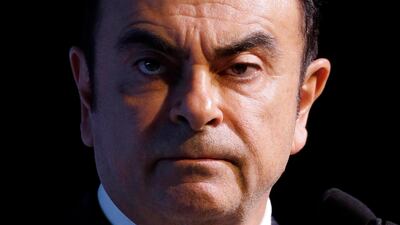Carlos Ghosn, the ousted leader of Japanese automaker Nissan, said his removal was a result of “plot and treason” by colleagues at the company who objected to a closer tie-up with Mitsubishi and France’s Renault under a new holding company.
Mr Ghosn made the remarks in an interview with Japan's Nikkei newspaper, his first interview since being detained by Japanese authorities on November 19 last year. Mr Ghosn, 64, a Brazilian-French-Lebanese citizen, was originally arrested along with his aide and Nissan board member George Kelly, who has since been released.
Mr Ghosn, who led Nissan for 19 years and rescued the company from bankruptcy before entering it into a three-way alliance with Renault and Mitsubishi, was dismissed from his position as chairman by Nissan in December following allegations of financial misconduct and underreporting his compensation – crimes that carry jail sentences of a decade or more in Japan. He has vehemently denied any wrongdoing and reiterated those denials in the interview with Nikkei.
Mr Ghosn brushed off accusations that his tenure at the helm of Nissan was authoritarian and said it was a narrative propagated by those who sought to remove him from his position. "People translated strong leadership to dictator, to distort reality" for the "purpose of getting rid of me", Mr Ghosn was quoted as saying by Nikkei.
Mr Ghosn denied he was in breach of trust and said payments made to Nissan’s Saudi business partner Khaled Al-Juffali were carried out from Nissan’s “CEO reserve” and “four officers signed” for the payment. Property purchased in Brazil and Lebanon, which Japanese media and Nissan executives touted as an extravagant example of Mr Ghosn’s alleged improprieties, were approved by Nissan’s legal department, and specifically an executive by the name of Hari Nada, Mr Ghosn said.
The spectacular fall of Mr Ghosn and the speed at which Nissan chief executive Hiroto Saikawa turned on his mentor raised speculation by French and Japanese media of an orchestrated coup to remove him and set the stage for a looming power struggle between Nissan and Renault over control of the world's biggest car alliance. Nissan is unhappy with what it perceives as its junior partner status, according to Japanese media reports.
The French government owns about 15 per cent of Renault, which in turn controls 43.4 per cent of Nissan. Nissan holds only a 15 per cent non-voting stake in its French partner.
The prolonged detention of Mr Ghosn has cast light on Japan’s judicial system, which allows the indefinite detention of individuals. Mr Ghosn has not been allowed to meet or communicate with family members and his repeated requests to be released on bail have been denied by Japanese authorities, despite providing assurances to wear an ankle tracking device and personally pay for security.

